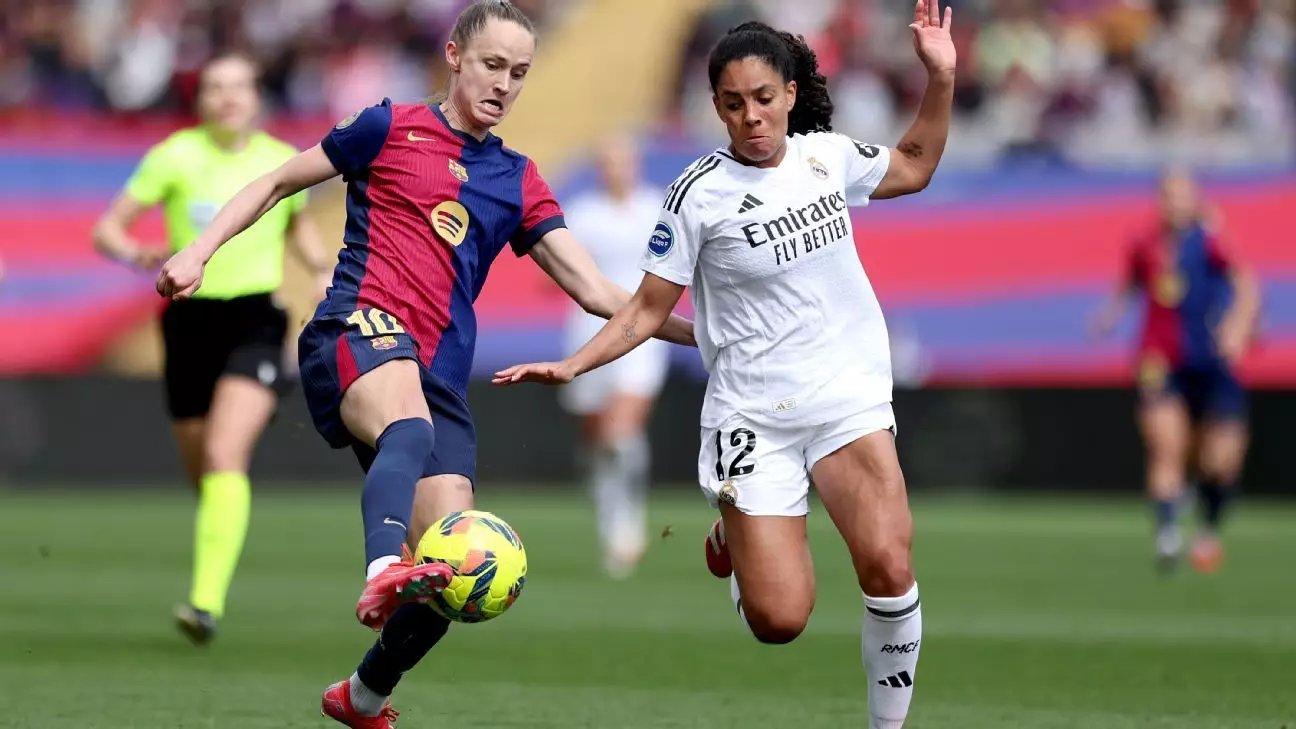In what can only be described as a historical moment for women’s football, Real Madrid achieved a monumental victory over Barcelona, marking their first-ever win in the storied matchup known as the Clásico. The match held at the Olympic Stadium was not just a game; it was a declaration of ambition and resilience. Caroline Weir emerged as the unlikely hero, stepping off the bench to score two late goals that sealed a 3-1 victory. Madrid’s performance was a powerful reminder that growth often follows adversity, especially in the world of sports where narratives are constantly rewritten.
The atmosphere was electric as fans anticipated a fiercely contested battle. Prior to this match, Real Madrid had endured a troubling 18-game winless streak against their rivals since the team was established in 2020. With Barcelona atop the Liga F standings and Madrid striving to close the four-point gap, the stakes could not have been higher. This wasn’t just a clash of two football clubs; it was a pivotal moment that could shift the psychological dynamics of women’s football in Spain.
Decisive Moments and Controversies
The match was rife with drama and pivotal moments that could have easily derailed Madrid’s momentum. Alba Redondo opened the scoring with a deft header, giving Madrid the early lead. However, the tide turned when Caroline Graham Hansen equalized for Barcelona, showcasing their relentless spirit. The constant ebb and flow of the match kept spectators on the edge of their seats, especially when controversy struck soon after. A potential Barcelona goal, credited to Jana Fernández, was disallowed for offside—a decision that generated heated debate in the stands. Replays later indicated that both Ewa Pajor and Fernández were clearly onside, but without the presence of VAR in Liga F, the referee’s decision stood firm.
Despite Madrid’s earlier lead, Barcelona displayed dominant control for much of the game and appeared ready to tip the scales in their favor. Yet, football is a sport defined by moments of brilliance, and Madrid’s resolve shone bright when they needed it most. The introduction of Weir into the fray added a new dimension to the game, bringing a sense of urgency and unpredictability that caught Barcelona off guard.
Weir’s Historic Contributions
With the game nearing its final minutes, and as Barcelona celebrated a presumed victory after dominating much of the match, Caroline Weir seized the opportunity to become the afternoon’s heroine. Connecting expertly with a cutback pass from Linda Caicedo, Weir found the back of the net in the 87th minute, sending shockwaves through the stadium. It was a defining moment, not only for Weir personally but for Real Madrid as a whole, as they finally crossed the threshold from perpetual underdogs to victors in a deeply anticipated rivalry.
To compound Barcelona’s misery, Weir didn’t stop there. In stoppage time, she managed to muscle a second goal across the line, capitalizing on a moment of disarray within the opposition’s defense. This was not merely a case of luck; it was a demonstration of Madrid’s newfound confidence and determination. The players not only absorbed the pressure exerted by Barcelona but also transitioned that pressure into motivation for their counter-attacks.
The Road Ahead for Both Teams
With this victory, Madrid not only resurrected their spirits but also kept their faint title hopes alive, positioning themselves just four points behind Barcelona with seven games remaining. Following this pivotal win, Real Madrid now has its sights set on further successes, both domestically and in the Champions League, where they had recently secured a win against Arsenal. This match, along with their previous victories, lays the groundwork for what could be a transformative period for the club.
Conversely, Barcelona, despite their title-contending status, must reevaluate their strategy after suffering this surprising defeat. The combination of a thorough understanding of match dynamics and an acute awareness of their opponents will be crucial as they move forward. Their loss came on the heels of earlier successes, including an 8-1 thrashing of Madrid in the Copa de la Reina semifinal, demonstrating the unpredictable nature of football.
As the dust settles from this thrilling encounter, one thing is clear: the tides of women’s football are changing, and with every match, the story continues to unfold. The battle between Real Madrid and Barcelona is now more than just a Clásico; it symbolizes the evolving competitive landscape of women’s football in Spain and, by extension, the world.

